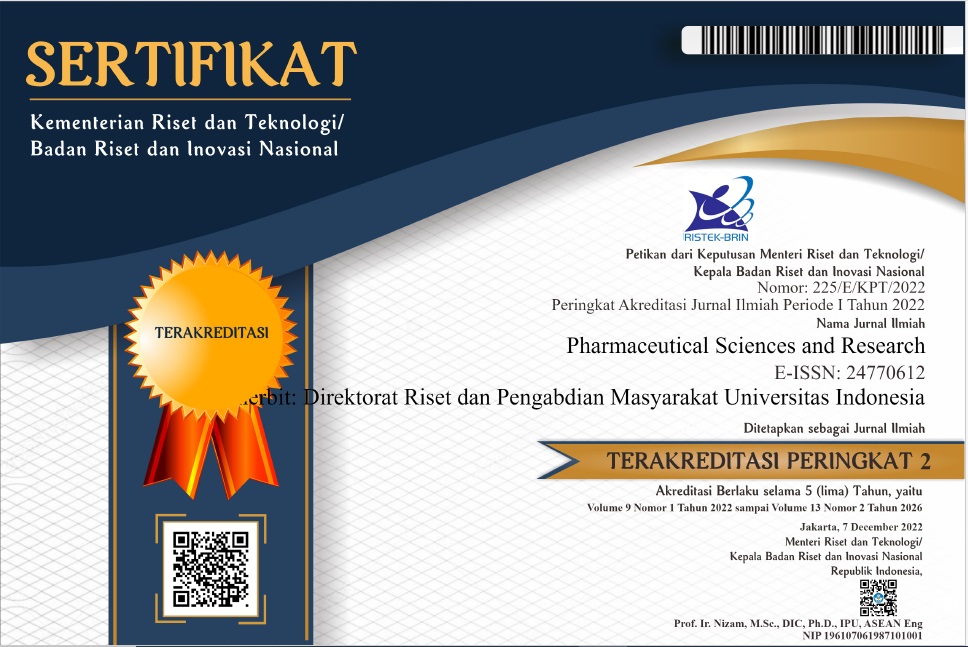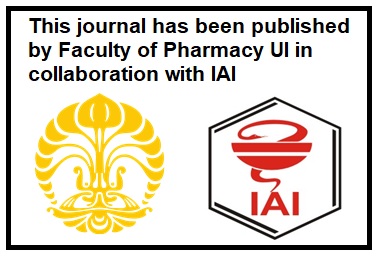Abstract
Type-2 diabetes mellitus has become a chronic disease that can lead to serious complications and can only be prevented by compliant treatment of the patients. Compliance can be influenced by various factors, one of which is interpersonal factors. This study aimed to identify various interpersonal relationship problems between patients and healthcare workers that can affect their treatment compliance behavior. This study employed a qualitative design with phenomenological methods. This research was conducted in Central Bogor City in March-August 2020. The data were collected by conducting in-depth interviews with 20 type-2 diabetes mellitus patients who had been confirmed by the Community Health Center and focus group discussions with 12 healthcare workers consisting of doctors, pharmacists, nutritionists, and nurses. The data were then transcribed and content clouds analysis was carried out. The results showed that most of the patients (76%) followed the advice given by healthcare workers to carry out routine controls. This is a form of patients’ trust in healthcare workers as their health consultants. The trust arises from the convenience of interaction between the two parties. Providing adequate information will increase patients’ understanding and encourage them to take appropriate action for themselves. As many as 12 out of 20 patients chose the Community Health Center for their routine control because the services were sufficient in treating type 2 diabetes mellitus. From this study, it can be concluded that patients tend to comply if they feel trust in the health workers, which arises if they can feel the benefits during their therapy.
References
Adhikary, G., Shawon, Md. S. R., Ali, Md. W., Shamsuzzaman, Md., Ahmed, S., Shackelford, K. A., Woldeab, A., Alam, N., Lim, S. S., Levine, A., Gakidou, E., & Uddin, Md. J. (2018). Factors influencing patients’ satisfaction at different levels of health facilities in Bangladesh: Results from patient exit interviews. PLOS ONE, 13(5), e0196643. https://doi.org/10.1371/journal.pone.0196643
Adikusuma, W. (2018). Adherence level and blood sugar control of type 2 diabetes mellitus patients who gets counseling and short messages service as reminder and motivation. Asian Journal of Pharmaceutical and Clinical Research, 11. https://doi.org/10.22159/ajpcr.2018.v11i2.22988
Alhabib, S., Aldraimly, M., & Alfarhan, A. (2016). An evolving role of clinical pharmacists in managing diabetes: Evidence from the literature. Saudi Pharmaceutical Journal, 24(4), 441–446. https://doi.org/10.1016/j.jsps.2014.07.008
AlHaidar, A. M., AlShehri, N. A., & AlHussaini, M. A. (2020). Family Support and Its Association with Glycemic Control in Adolescents with Type 1 Diabetes Mellitus in Riyadh, Saudi Arabia. Journal of Diabetes Research, 2020, e5151604. https://doi.org/10.1155/2020/5151604
Bagonza, J., Rutebemberwa, E., & Bazeyo, W. (2015). Adherence to anti diabetic medication among patients with diabetes in eastern Uganda; a cross sectional study. BMC Health Services Research, 15(1), 168. https://doi.org/10.1186/s12913-015-0820-5
Bakar, Z. A., Fahrni, M. L., & Khan, T. M. (2016). Patient satisfaction and medication adherence assessment amongst patients at the diabetes medication therapy adherence clinic. Diabetes & Metabolic Syndrome: Clinical Research & Reviews, 10(2), S139–S143. https://doi.org/10.1016/j.dsx.2016.03.015
Bhaloo, T., Juma, M., & Criscuolo-Higgins, C. (2018). A solution-focused approach to understanding patient motivation in diabetes self-management: Gender differences and implications for primary care. Chronic Illness, 14(4), 243–255. https://doi.org/10.1177/1742395317736372
Bruce, S. P., Acheampong, F., & Kretchy, I. (2015). Adherence to oral antidiabetic drugs among patients attending a Ghanaian teaching hospital. Pharmacy Practice, 13(1), 533. https://doi.org/10.18549/PharmPract.2015.01.533
Butt, M., Mhd Ali, A., Bakry, M. M., & Mustafa, N. (2016). Impact of a pharmacist led diabetes mellitus intervention on HbA1c, medication adherence and quality of life: A randomised controlled study. Saudi Pharmaceutical Journal, 24(1), 40–48. https://doi.org/10.1016/j.jsps.2015.02.023
Centers of Diseased and Prevention. (2020). National Diabetes Statistics Report 2020. Estimates of diabetes and its burden in the United States. US Department of Health and Human Services.
Cole, J. B., & Florez, J. C. (2020). Genetics of diabetes mellitus and diabetes complications. Nature Reviews Nephrology, 16(7), 377–390. https://doi.org/10.1038/s41581-020-0278-5
Daniel, O., Dest, A., Munson, A., Pulley, D. V., Sadeghzadeh, C., Golin, C., & Cené, C. W. (2020). Interventions to Enhance Patient and Family Engagement Among Adults With Multiple Chronic Conditions: A Systematic Scoping Review. Medical Care, 58(4), 407–416. https://doi.org/10.1097/MLR.0000000000001274
Das, A. (2020). Fighting diabetic blindness: An urgent global issue concerning patients, physicians and public policy. Indian Journal of Ophthalmology, 68(13), 6. https://doi.org/10.4103/ijo.IJO_2342_19
Doumas, M., Imprialos, K., Stavropoulos, K., & Athyros, V. G. (2020). Pharmacological Management of Type 2 Diabetes Complications. Current Vascular Pharmacology, 18(2), 101–103. https://doi.org/10.2174/157016111802200101155519
Egbujie, B. A., Grimwood, A., Mothibi-Wabafor, E. C., Fatti, G., Tshabalala, A. M. E. T., Allie, S., Vilakazi, G., & Oyebanji, O. (2018). Impact of ‘Ideal Clinic’ implementation on patient waiting time in primary healthcare clinics in KwaZulu-Natal Province, South Africa: A before-and-after evaluation. South African Medical Journal, 108(4), 311. https://doi.org/10.7196/SAMJ.2018.v108i4.12583
Farris, K. B., Mitrzyk, B. M., Batra, P., Peters, J., Diez, H. L., Yoo, A., McKay, K., Friend, K., Danko, L., Waber, R., Marshall, V. D., & Choe, H. M. (2019). Linking the patient-centered medical home to community pharmacy via an innovative pharmacist care model. Journal of the American Pharmacists Association, 59(1), 70-78.e3. https://doi.org/10.1016/j.japh.2018.09.009
Faselis, C., Katsimardou, A., Imprialos, K., Deligkaris, P., Kallistratos, M., & Dimitriadis, K. (2020). Microvascular Complications of Type 2 Diabetes Mellitus. Current Vascular Pharmacology, 18(2), 117–124. https://doi.org/10.2174/1570161117666190502103733
Grohmann, B., Espin, S., & Gucciardi, E. (2017). Patients’ experiences of diabetes education teams integrated into primary care. 9.
Guénette, L., Lauzier, S., Guillaumie, L., Giguère, G., Grégoire, J.-P., & Moisan, J. (2015). Patients beliefs about adherence to oral antidiabetic treatment: A qualitative study. Patient Preference and Adherence, 413. https://doi.org/10.2147/PPA.S78628
Harvey, J. N. (2015). Psychosocial interventions for the diabetic patient. Diabetes, Metabolic Syndrome and Obesity: Targets and Therapy, 8, 29–43. https://doi.org/10.2147/DMSO.S44352
Hughes, J. D., Wibowo, Y., Sunderland, B., & Hoti, K. (2017). The role of the pharmacist in the management of type 2 diabetes: Current insights and future directions. Integrated Pharmacy Research & Practice, 6, 15–27. https://doi.org/10.2147/IPRP.S103783
Iqbal, Q., Bashir, S., Iqbal, J., Iftikhar, S., & Godman, B. (2017). Assessment of medication adherence among type 2 diabetic patients in Quetta city, Pakistan. Postgraduate Medicine, 129(6), 637–643. https://doi.org/10.1080/00325481.2017.1328251
Jahangard-Rafsanjani, Z., Sarayani, A., Nosrati, M., Saadat, N., Rashidian, A., Hadjibabaie, M., Ashouri, A., Radfar, M., Javadi, M., & Gholami, K. (2015). Effect of a Community Pharmacist–Delivered Diabetes Support Program for Patients Receiving Specialty Medical Care: A Randomized Controlled Trial. The Diabetes Educator, 41(1), 127–135. https://doi.org/10.1177/0145721714559132
Jalil, A., Zakar, R., Zakar, M. Z., & Fischer, F. (2017). Patient satisfaction with doctor-patient interactions: A mixed methods study among diabetes mellitus patients in Pakistan. BMC Health Services Research, 17(1), 155. https://doi.org/10.1186/s12913-017-2094-6
Kc, S., S, S., Sk, S., Sm, S., & Bk, J. (2019). Patient Characteristics Associated With Medication Adherence to Antidiabetic Drugs. Mymensingh Medical Journal : MMJ, 28(2), 423–428.
Kirkman, M. S., Rowan-Martin, M. T., Levin, R., Fonseca, V. A., Schmittdiel, J. A., Herman, W. H., & Aubert, R. E. (2015). Determinants of Adherence to Diabetes Medications: Findings From a Large Pharmacy Claims Database. Diabetes Care, dc142098. https://doi.org/10.2337/dc14-2098
Krass, I., Schieback, P., & Dhippayom, T. (2015). Adherence to diabetes medication: A systematic review. Diabetic Medicine, 32(6), 725–737. https://doi.org/10.1111/dme.12651
Linmans, J. J., Knottnerus, J. A., & Spigt, M. (2015). How motivated are patients with type 2 diabetes to change their lifestyle? A survey among patients and healthcare professionals. Primary Care Diabetes, 9(6), 439–445. https://doi.org/10.1016/j.pcd.2015.02.001
Malewski, D. F., Ream, A., & Gaither, C. A. (2015). Patient satisfaction with community pharmacy: Comparing urban and suburban chain-pharmacy populations. Research in Social and Administrative Pharmacy, 11(1), 121–128. https://doi.org/10.1016/j.sapharm.2014.05.001
Murphy, K., Chuma, T., Mathews, C., Steyn, K., & Levitt, N. (2015). A qualitative study of the experiences of care and motivation for effective self-management among diabetic and hypertensive patients attending public sector primary health care services in South Africa. BMC Health Services Research, 15(1), 303. https://doi.org/10.1186/s12913-015-0969-y
Newman, P. M., Franke, M. F., Arrieta, J., Carrasco, H., Elliott, P., Flores, H., Friedman, A., Graham, S., Martinez, L., Palazuelos, L., Savage, K., Tymeson, H., & Palazuelos, D. (2018). Community health workers improve disease control and medication adherence among patients with diabetes and/or hypertension in Chiapas, Mexico: An observational stepped-wedge study. BMJ Global Health, 3(1), e000566. https://doi.org/10.1136/bmjgh-2017-000566
Novianti, M., & Ayu, M. (2019). Factors That Are Related to the Compliance of Blood Sugar Control in Mellitus Type 2 Diabetation Patients in the Cipondoh Puskesmas Working Area in 2019: Proceedings of the 1st International Conference on Health, 272–277. https://doi.org/10.5220/0009593102720277
Odnoletkova, I., Buysse, H., Nobels, F., Goderis, G., Aertgeerts, B., Annemans, L., & Ramaekers, D. (2016). Patient and provider acceptance of telecoaching in type 2 diabetes: A mixed-method study embedded in a randomised clinical trial. BMC Medical Informatics and Decision Making, 16(1), 142. https://doi.org/10.1186/s12911-016-0383-3
Peimani, M., Nasli-Esfahani, E., & Sadeghi, R. (2020). Patients’ perceptions of patient–provider communication and diabetes care: A systematic review of quantitative and qualitative studies. Chronic Illness, 16(1), 3–22. https://doi.org/10.1177/1742395318782378
Polonsky, W., & Henry, R. (2016). Poor medication adherence in type 2 diabetes: Recognizing the scope of the problem and its key contributors. Patient Preference and Adherence, Volume 10, 1299–1307. https://doi.org/10.2147/PPA.S106821
Presley, B., Groot, W., & Pavlova, M. (2019). Pharmacy-led interventions to improve medication adherence among adults with diabetes: A systematic review and meta-analysis. Research in Social and Administrative Pharmacy, 15(9), 1057–1067. https://doi.org/10.1016/j.sapharm.2018.09.021
Pusat Data dan Informasi Kementerian Kesehatan Republik Indonesia. (2018). Infodatin Hari Diabetes Sedunia 2018. Kementerian Kesehatan Republik Indonesia.
Ramaiya, K. L., Swai, A. M., Mutabingwa, T. K., Mwanri, A. W., & Kagaruki, G. B. (2018). Capacity and capability of Tanzania health facilities to diagnose and manage diabetes mellitus in pregnancy. Diabetes Research and Clinical Practice, 145, 119–129. https://doi.org/10.1016/j.diabres.2018.05.003
Roglic, G., & World Health Organization (Eds.). (2016). Global report on diabetes. World Health Organization.
Saisho, Y. (2018). Use of Diabetes Treatment Satisfaction Questionnaire in Diabetes Care: Importance of Patient-Reported Outcomes. International Journal of Environmental Research and Public Health, 15(5), 947. https://doi.org/10.3390/ijerph15050947
Seehusen, D. A., Fisher, C. L., Rider, H. A., Seehusen, A. B., Womack, J. J., Jackson, J. T., Crawford, P. F., & Ledford, C. J. W. (2019). Exploring patient perspectives of prediabetes and diabetes severity: A qualitative study. Psychology & Health, 34(11), 1314–1327. https://doi.org/10.1080/08870446.2019.1604955
Shaha, K. C., Khan, M. A., Akter, F., & Jyoti, B. K. (2019). Medication Adherence Patterns to Antidiabetic Drugs among Type 2 Diabetic Patients. Medicine Today, 31(1), 19–22. https://doi.org/10.3329/medtoday.v31i1.40316
Shams, A. M., Rose, L. J., Edwards, J. R., Cali, S., Harris, A. D., Jacob, J. T., LaFae, A., Pineles, L. L., Thom, K. A., McDonald, L. C., Arduino, M. J., & Noble-Wang, J. A. (2016). Assessment of the Overall and Multidrug-Resistant Organism Bioburden on Environmental Surfaces in Healthcare Facilities. Infection Control and Hospital Epidemiology, 37(12), 1426–1432. https://doi.org/10.1017/ice.2016.198
Siaw, M. Y. L., Ko, Y., Malone, D. C., Tsou, K. Y. K., Lew, Y.-J., Foo, D., Tan, E., Chan, S. C., Chia, A., Sinaram, S. S., Goh, K. C., & Lee, J. Y.-C. (2017). Impact of pharmacist-involved collaborative care on the clinical, humanistic and cost outcomes of high-risk patients with type 2 diabetes (IMPACT): A randomized controlled trial. Journal of Clinical Pharmacy and Therapeutics, 42(4), 475–482. https://doi.org/10.1111/jcpt.12536
Thepwongsa, I., Muthukumar, R., & Kessomboon, P. (2017). Motivational interviewing by general practitioners for Type 2 diabetes patients: A systematic review. Family Practice, 34(4), 376–383. https://doi.org/10.1093/fampra/cmx045
Tiktin, M., Celik, S., & Berard, L. (2016). Understanding adherence to medications in type 2 diabetes care and clinical trials to overcome barriers: A narrative review. Current Medical Research and Opinion, 32(2), 277–287. https://doi.org/10.1185/03007995.2015.1119677
Twigg, M. J., Bhattacharya, D., Desborough, J. A., & Wright, D. (2015). A drop-in clinic for patients with poorly-controlled diabetes: A community pharmacy feasibility study. International Journal of Clinical Pharmacy, 37(2), 395–402. https://doi.org/10.1007/s11096-015-0076-5
Varming, A. R., Hansen, U. M., Andrésdóttir, G., Husted, G. R., & Willaing, I. (2015). Empowerment, motivation, and medical adherence (EMMA): The feasibility of a program for patient-centered consultations to support medication adherence and blood glucose control in adults with type 2 diabetes. Patient Preference and Adherence, 9, 1243–1253. https://doi.org/10.2147/PPA.S85528
Vignon Zomahoun, H. T., de Bruin, M., Guillaumie, L., Moisan, J., Grégoire, J.-P., Pérez, N., Vézina-Im, L.-A., & Guénette, L. (2015). Effectiveness and Content Analysis of Interventions to Enhance Oral Antidiabetic Drug Adherence in Adults with Type 2 Diabetes: Systematic Review and Meta-Analysis. Value in Health, 18(4), 530–540. https://doi.org/10.1016/j.jval.2015.02.017
Vluggen, S., Hoving, C., Schaper, N. C., & de Vries, H. (2018). Exploring beliefs on diabetes treatment adherence among Dutch type 2 diabetes patients and healthcare providers. Patient Education and Counseling, 101(1), 92–98. https://doi.org/10.1016/j.pec.2017.07.009
Williams, J. R., Halstead, V., Salani, D., & Koermer, N. (2017). An exploration of screening protocols for intimate partner violence in healthcare facilities: A qualitative study. Journal of Clinical Nursing, 26(15–16), 2192–2201. https://doi.org/10.1111/jocn.13353
Winahyu, K. M., Anggita, R., & Widagdo, G. (2020). Factors Predicting Quality of Life among Patients with Type 2 Diabetes Mellitus in Primary Health Center in Tangerang, Indonesia. Conference, 8. World Health Organization. (2019). Clasiffication of Diabetes Mellitus 2019.
Zhang, X., Foo, S., Majid, S., Chang, Y.-K., Dumaual, H. T. J., & Suri, V. R. (2020). Self-Care and Health-Information-Seeking Behaviours of Diabetic Patients in Singapore. Health Communication, 35(8), 994–1003. https://doi.org/10.1080/10410236.2019.1606134
Zullig, L. L., Gellad, W. F., Moaddeb, J., Crowley, M. J., Shrank, W., Granger, B. B., Granger, C. B., Trygstad, T., Liu, L. Z., & Bosworth, H. B. (2015). Improving diabetes medication adherence: Successful, scalable interventions. Patient Preference and Adherence, 9, 139–149. https://doi.org/10.2147/PPA.S69651
Recommended Citation
Renaldi, Fransiskus Samuel; Riyadina, Woro; Qamar, Muhammad; and Sauriasari, Rani
(2021)
"Interpersonal Relationship and Its Effect on Treatment Compliance in Patients with Type-2 Diabetes Mellitus,"
Pharmaceutical Sciences and Research: Vol. 8:
No.
1, Article 3.
DOI: 10.7454/psr.v8i1.1105
Available at:
https://scholarhub.ui.ac.id/psr/vol8/iss1/3
Included in
Natural Products Chemistry and Pharmacognosy Commons, Other Pharmacy and Pharmaceutical Sciences Commons, Pharmaceutics and Drug Design Commons








